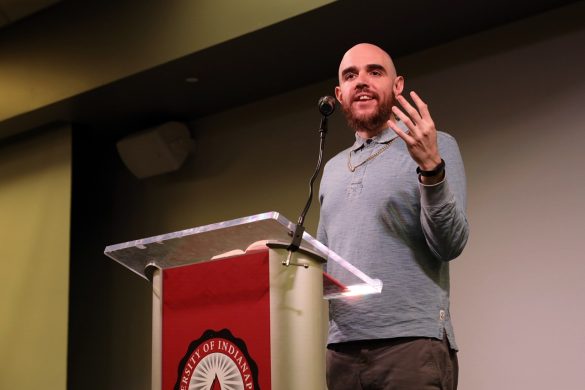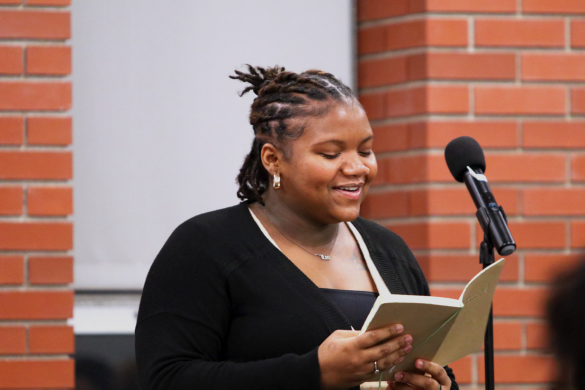
Brayton Lipperd as Doug and Noel Robleto as Aaron in Pillow Talk directed by Stephan Alan Cox on April 21. Photo by Badar Alageel.
The Student Directed Productions at the University of Indianapolis brought an even mixture of comedy and drama this semester. The SDPs were held in the Studio Theatre at 8 p.m. in the basement of Esch Hall and featured four one-act plays over the span of nearly two hours. The four shows were titled “10,000 Cigarettes,” Crazy Eights,” “Pillow Talk” and “Sorry, Wrong Number.”
“10,000 Cigarettes” follows the conversation of four sisters, all named Gloria, discussing their favorite pastime: smoking cigarettes. The sisters were played by freshman communication major Sarah Galliher, sophomore theatre major Daisy Gray, sophomore theatre education major Mary Schreier and senior theatre major Kristine Storms. Most of the play consists of the sisters describing their favorite cigarettes, their ideal cigarette fantasies, but ends on a more serious note after the audience discovers that the sisters’ father died of lung cancer from smoking.
The director of “10,000 Cigarettes,” sophomore theatre education major Zech Saenz, wanted to portray a serious message with his production.
“I really wanted to do this piece [“10,000 Cigarettes”] because it was something that could speak to people and have an underlying message. Even though it’s kind of fun it the beginning, the message is still there in the end,” he said.
“Crazy Eights,” directed by junior theatre and communication major Elizabeth Holbrook, depicts a relationship between a woman and her parole officer. The show starts with the character Connie, played by freshman theatre major Destiny Heugel, coming home to her six-story apartment to find her parole officer, Benny, played by freshman theatre major Jameise Kemp, waiting for her after having climbed through her window. Later, the character Cliff, played by junior theatre major Tyrell Harris, joins the two characters, which is when the audience learns that Benny is in love with her parolee.
According to Holbrook, the show takes a very different approach to comedy than most shows because of the strange relationship of its characters. This was Holbrook’s fist time directing for SDPs, and she said she learned a lot about collaboration.
“The most interesting thing about actually having to direct an SDP is the collaboration,” Holbrook said. “You work with the designers a lot more, and you realize how much it takes to put on a full-fledged production. And this is just a one-act [production]; it’s only 20 minutes. So it’s kind of crazy thinking how that adapts to a full-length play.”
“Pillow Talk,” directed by junior theatre major Stephen Cox, is about two characters Aaron, played by sophomore theatre major Noel Robleto, and Doug, played by freshman theatre major Brayton Lipperd,—who have just finished their first day of a cross-country road trip. The play takes place in a mobile home owned by Aaron’s grandmother. The comedy ensues when Doug learns that the men must share a bed. The show touches on themes of friendship and even on issues such as sexual identity and homosexuality.
Cox said that during process of directing the show, he learned to adapt well to others’ ideas during the creative process.
“One of my philosophies in my directing process is making sure that I don’t use my vision to hold my designers hostage,” Cox said. “I try to stray away from ‘it’s my way or the highway,’ because I think the whole point of theatre is to create a collaborative product. If a director is holding his vision and his idea over everything, and not allowing his designers or production team to give their own input and life experiences into the process, I don’t think you’ll have a good product in the end.”
The final show, “Sorry, Wrong Number,” was unique in that it was adapted from a radio drama. Senior theatre major Tim Allen directed the show and described it as something you would see in an episode of “The Twilight Zone,”” and even included the opening monologue of that series at the start of “Sorry, Wrong Number.” The play focuses on one character, Mrs. Stevenson, played by sophomore theatre major Emery Lade, and is set in New York in the 1940s, which is portrayed through black and white makeup, and an all black and white set. Mrs. Stevenson, a bed-ridden invalid, tries to contact her husband at work by telephone. When the operator connects her through, she overhears a conversation of two men planning the murder of a woman. She assumes it’s the wrong number but decides to pursue the issue and contacts both the operator’s board and the police. At one point, Mrs. Stevenson hears someone in her house and realizes that she is the intended murder victim. Allen said that it was important for him to effectively develop a relationship between Mrs. Stevenson and the audience.
“A lot of it was making sure the audience understands that they are listening in on conversations,” Allen said, “making sure they connect to the character that is there. It was a lot of heavy work making sure that character was as real as possible, so that way the other elements would fit. It’s very different from what normal theatre is, which is ‘hey, bright lights and make it a spectacle,” whereas this one is more toned down and inclusive for the audience.”









